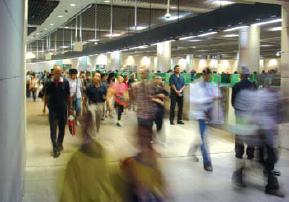 End in Sight for Travel Restrictions?
End in Sight for Travel Restrictions?
Recession could lead to China relaxing travel rules, says Goldman Sachs
A crucial factor in the Macau revenue mix since 2003, however, is the implementation by China of the Individual Visit Scheme in 2003, the research paper points out. The IVS allows residents of selected cities in Mainland China to travel to Macau unescorted. Up to 2002, the year Stanley Ho’s 40-year casino monopoly ended, only 20% of Macau’s visitors came from Mainland China. By the end of 2003, the proportion had risen to more than 50%.
However the benefits of the IVS scheme are likely be muted during this recession by the impact of the rationing of visits under the IVS to as infrequently as four times a year.
“For 2009E, we believe the [gaming revenue] growth may be similar to the levels in 1998/99 unless the government announces some relaxation in its policies. Besides, high competition for junket commissions earlier this year had driven up rolling volumes, making 1H2008 a high base for comparison next year,” says the research paper.
Encouraging signs?
Goldman Sachs says the global economic turmoil could be a factor leading to a relaxation of the travel restrictions from China.
“In recent weeks, the media (including Hong Kong newspaper South China Morning Post and Macao Daily) quoted various government officials as saying that the Chinese government is fully supportive of Macau’s development, thereby encouraging hope that some relaxations of the policies may be announced in the near term,” says the research paper.
“Although it is difficult to estimate whether and when this will happen, we believe the key considerations are first: well-being of the economy; and second, social issues in Macau.
“Macau’s economy is heavily dependent on tourism with 56% of its GDP coming from gaming/public spending and 9% from retail/ entertainment. A relaxation in travel restrictions and hence a recovery in tourist arrivals would have a direct effect on the economy, in our view. On the other hand, the influx of mainland tourists also has a social impact on Macau (e.g. illegal workers, rising crime rates), which may take time to resolve. We believe the government would aim to strike a balance between the two.
“We believe factors such as Macau’s GDP growth slowing down drastically or unemployment rising sharply may prompt the government to reconsider its policies. In 1H2008, Macau recorded 26% real GDP growth, which our economics team forecasts will slow to 6% in 2H2008,” says the report.





























